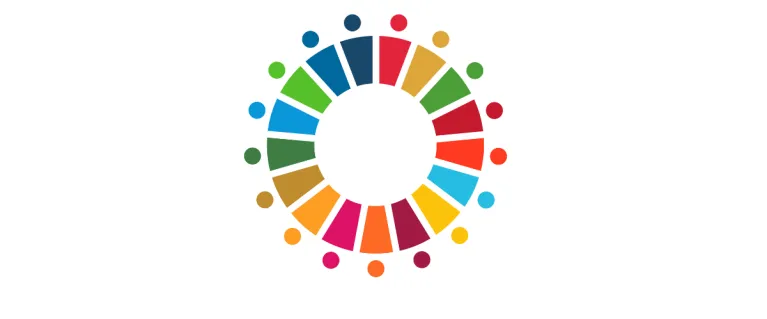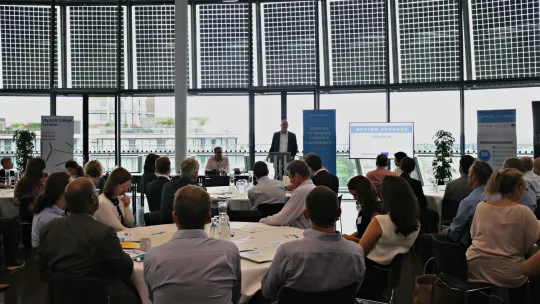
UN Sustainable Development Goals work
The United Nations Sustainable Development Goals (UN SDGS) are a collection of 17 global goals agreed by world leaders in 2015. They aim to improve all aspects of people’s quality of life. They include targets to boost decent jobs and housing, eliminate poverty, hunger and inequality, and combat climate change and environmental degradation.

The graphic has the heading "The Global Goals for sustainable development". It shows a grid with a differently coloured tile for each goal. The goals are:
- No Poverty
- Zero hunger
- Good health and well-being
- Quality education
- Gender equality
- Clean water and sanitation
- Affordable and clean energy
- Decent work and economic growth
- Industry, innovation and infrastructure
- Reduced inequalities
- Sustainable cities and communities
- Responsible consumption and production
- Climate action
- Life below water
- Life on land
- Peace, justice, and strong institutions
- Partnerships for the goals
The SDGs were originally designed for national governments, but cities, businesses and others have also adopted them. The SDGs echo the Mayor of London’s commitment, and that of many London boroughs, to tackle the climate and ecological emergency, while creating a fairer city that empowers all Londoners to prosper.
LCSC reporting on London's progress towards the SDGs
Since 2004, the LCSC has produced Quality of Life (QoL) reports on London’s sustainability. There have been five reports in total. The last, in 2017, found that although London was making progress towards becoming environmentally, socially and economically sustainable, there were still major challenges to be tackled.
.Read our previous Quality of Life Indicators reports:
- 2017 summary and full evidence report
- 2012 summary and full evidence report
- 2009 report
- 2005 report
- 2004 report
Building on the Quality of Life reports, in 2021 the LCSC published ‘London’s progress towards meeting the UN’s SDGs’. This is the first comprehensive assessment of London’s local contribution to the UN Sustainable Development Goals (SDGs).
The report aimed to inform integrated city decision-making for sustainability. It also aimed to explore the role the SDGs could play in providing a template for London’s green and fair recovery from the pandemic, achieving a better, fairer and more prosperous city while living within planetary boundaries.
The report found that the SDGs provide an opportunity to:
- help create decent jobs and ensure a just transition to a zero-carbon circular economy
- improve public health and wellbeing
- create a fairer, more cohesive and inclusive society
- leave a London that is fit for generations to come.
LCSC SDGs London full report
London's progress towards the SDGs - final data annex
2020 insights paper
In 2020 the LCSC published an insights paper on how the SDGs could help London’s fair and green recovery. The paper argued that the SDGs provide a strategic framework enabling decision-makers to take a joined up approach to issues including inequalities, healthcare, housing, jobs, the environment and more. The paper made five recommendations:
- London needs more affordable, high quality and energy-efficient homes: The UK government should devolve fiscal and regulatory powers, so London can scale up its programmes to retrofit existing homes.
- Enhance urban green spaces: Government should ensure sufficient funding, and the Mayor and boroughs should make permanent the Streetspace works to form a network of greener public realm.
- Invest in the green, ethical business of the future: Government should ensure any stimulus packages are accompanied by binding and measurable environmental targets.
- We need a Future Finance Facility to unlock green investment: The Mayor should continue to work in partnership with stakeholders to leverage private finance.
- The SDGS should support London’s pandemic recovery planning: Decision-makers should use the SDGs framework (adapted to London) to take integrated approaches, use indicator data in evaluations, and ensure sustainability issues are factored into all decision-making.
Download the 2020 insights paper
What the LCSC delivered
The LCSC:
- Partnered with academics from Newcastle University and UKSSD, the authors of the ‘Levelling Up’ report on the UK’s SDG performance.
- Selected a set of indicators tailored to London which gave insights on poverty, housing, the environment, jobs and the economy, education and health, and social cohesion and democratic participation. The indicators were based on the SDG's call to ‘Leave no one behind’ – i.e. prioritise the most marginalised. They could be disaggregated by demographic and area.
- Published an interim ‘Insights paper’ in July 2020 showing how the SDGs could help London’s green and fair recovery.
- Published a full report in March 2021, providing deep and analysis of our cross-cutting indicator set. Rather than assessing each SDG individually, we used the holistic lens of ‘People, Planet, Place, Partnerships, Peace’.
Recommendations and outcomes
The report’s key recommendations were:
- To establish a partnership network to deliver the SDGs in London.
- To adopt the SDGs’ principles in London’s recovery governance.
- An integrated approach to sustainability issues.
- Centring democratic input from community voices.
- A partnership approach.
- Leaving no one behind.
These recommendations have been successfully adopted by the GLA and London Recovery Board - although not necessarily ‘badged’ with the SDGs, the SDGs priority themes and principles underpin the new approach taken to London-wide policy and programme development.
Partnerships
- The London Recovery Board was established to take a partnership approach to implementing the recovery among a range of stakeholders. The LRB comprises leaders from local and national government, the public sector, business, academia and the third sector.
- Flowing from this, new work was launched to engage more deeply with communities in policy development, and to establish community hubs, both acting as peer networks for London’s communities and to interface with policy makers.
- The London Anchor Institution Network was also established to drive institutional progress on environmental and socio-economic goals.
In combination, these networks effectively addressed the gaps identified in the SDGs report. Although the report recommended that the LCSC establish an ‘SDGs Hub’, these new networks removed the need for a standalone SDG-focused network.
Governance
The LRB’s London’s Recovery Programme comprises nine work programmes – ‘missions’ – and six ‘cross-cutting principles’ which are embedded into each work programme and which map to the SDGs. The LCSC secretariat is responsible for coordinating the ‘green new deal’ mission, and co-designed the Cross-Cutting Principles architecture to ensure it delivers on the SDGs.
Reporting
The LCSC has always reported on Quality of Life with the intention that this should ultimately be integrated into GLA reporting mechanisms, so that the Mayor can resource and take ownership of the reporting, and act on its findings.
The Mayor made a manifesto commitment to do just this in 2021, and the GLA is now delivering this by developing a regular ‘Wellbeing and Sustainability Index’ report. The LCSC has input to ensure alignment with the SDGs. The GLA has also taken input from Londoners in developing the metrics, which the LCSC endorses.
The LCSC will continue to review how the SDGs are embedded in this reporting, exploring any future contribution the Commission may make to this work.
Video of the 2020 SDG event
Playing this video will set cookies from YouTube/Google
Jointly organised by GLOBE International and the LCSC, this 2020 event brought together politicians, city leaders, legal scholars and campaigners to explore how the UN SDGs could provide a blueprint for recovery from the pandemic.
Related resources
Need a document on this page in an accessible format?
If you use assistive technology (such as a screen reader) and need a version of a PDF or other document on this page in a more accessible format, please get in touch via our online form and tell us which format you need.
It will also help us if you tell us which assistive technology you use. We’ll consider your request and get back to you in 5 working days.

